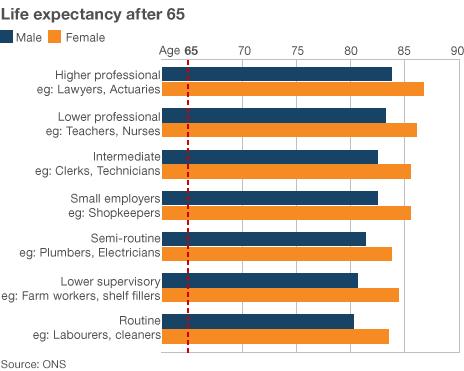Do those who retire early live longer?
- Published

It's often said that early retirement lengthens your life, but is it true? And do some professions have a shorter life expectancy?
If a statistical claim is repeated often enough it can become accepted as a universal truth, even if it has no basis in fact.
There's the suggestion that 93% of communication is non-verbal (not true) or the oft-repeated suggestion that there are more people alive today than have ever lived (not true either).
Here's another - the later you retire, the earlier you will die. A variation on this theme is the "fact" that, in some jobs, average life expectancy after retirement is just 18 months. We've seen it said of teachers, prison officers, surgeons and others.
The implication is that people in these kinds of demanding jobs are working themselves into their graves - and should probably be cut some slack. But is there any evidence for it?
Some evidence does at first glance appear to exist to support the first claim - that people who work longer die younger than those who retire early.
A paper attributed to the aircraft-maker Boeing shows that employees who retire at 55 live to, on average, 83. But those who retire at 65 only last, on average, another 18 months.
The "Boeing study" has been quoted by newspapers, magazines and pundits. It's circulated on the internet for years. The problem with it is that Boeing itself says it's simply not true.
Putting Boeing to one side, then, is there any other evidence which might support the idea that retiring early prolongs life? Surprisingly, perhaps, the truth may be the precise opposite: the later you retire, the longer you live.
Epidemiologists at the oil firm Shell carried out a study of past employees in the US, which found that mortality was slightly earlier - on average - for staff who retired at 55, than for those who continued working to 65.
But the actuary Dave Grimshaw says we need to be very careful about what conclusions we draw from the Shell data. The statistical waters, he says, are muddied by the fact that people retire at different ages for different reasons.
"You will have a group who are forced to retire [early] as a result of ill health and that may impact on their life expectancy," he says.
"In contrast there will be other people that choose to retire at 55, as more of a lifestyle decision. They may well be more affluent people. And they will also probably be in good health."
People who retire early because they are seriously ill will make average life expectancy for all retirees of that age look lower.
There's another statistical trap. Some of the people who retire at 55 will die before they reach 65. But of course no-one who retires at 65 will have died before they reached that age. That also distorts the data.

Do those who retire later die sooner?
So although it may appear to be the case that people who retire earlier will, on average, die earlier - the exact opposite of the claim that's often made - one can't deduce that retirement itself is the reason. There is probably no causal connection at all.
But there is some truth behind the suggestion that workers in some professions die earlier than others. That is, perhaps, unsurprising; some jobs are more physically demanding than others, and may be more damaging to health. According to data from UK's Office for National Statistics, however, the difference - at least in Britain - is not marked.
"Lawyers, accountants and so on are a group [in the ONS data] called 'higher managerial and professional'," says Grimshaw. "They would have life expectancy of nearly 19 years for males at age 65. At the other end of the scale, you would have occupations such as labourers and cleaners, where life expectancy at 65 is nearer 15 years."
Again, the reasons for the different life expectancies between job types might not be straightforward. Grimshaw says the gap might have more to do with socio-economic class - in other words, the fact that labourers and cleaners are more likely to come from poorer backgrounds than lawyers and accountants - than to the nature of the work itself.

In looking for examples of the claim that average life expectancy at retirement for certain professions is only 18 months, More or Less found that teachers are repeat offenders in claiming this.
"I'm not sure why teachers would expect to have short life expectancy," says Grimshaw. "They are an above average social economic group. Office for National Statistics data would suggest that teachers and similar groups to them would have over 18 years to live at age 65 [for men]."
Even that cheering news is almost certainly an underestimate, because it is based on current mortality figures, and life expectancy is increasing all the time. Grimshaw says teachers and other professionals are likely to have closer to 25 or even 30 years left in them at 65.
So next time a teacher tells you, resignedly, that they work so hard they can expect to survive only 18 months after retirement, point out that their pessimism is based on a myth. Where that leaves their pensions, however, is another matter.